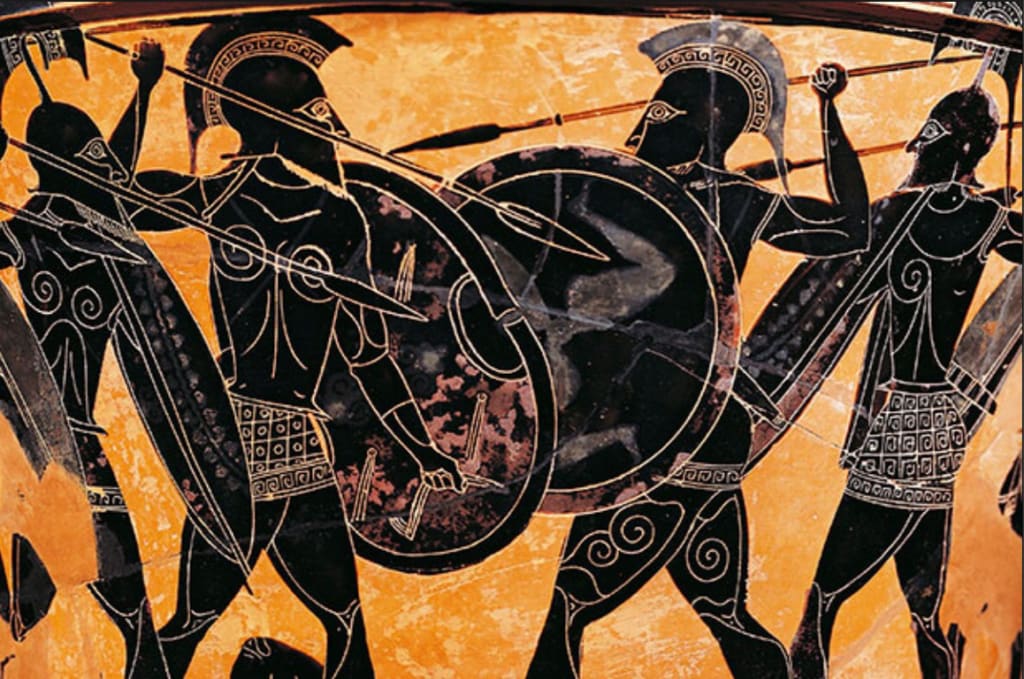What You Need to Know About the Peloponnesian War
The basics of a civil war that almost destroyed Ancient Greece

When reminiscing upon the history of ancient civilizations, it is easy to emphasize the glorious contributions to modern day society: the art, architecture, culture, theology, philosophy, politics, and technology. Ancient Greece gave modern society democracy, algebra, theater, the Archimedes Screw, stunning sculpture, and rich mythology; yet when it comes to common knowledge, civil wars and bloody battles are often overlooked in favor of the culture’s crowning achievements. Yet, much can be learned from war, especially when it involves a divided nation.
First, you need to know that the Persians were the biggest enemies of the Greeks—they believed that the Persians were purely barbaric, and the Persians despised the Greeks in return. If you have ever seen any of the 300 movies, then you are already aware of this rivalry. Every time they went to war, it was like a match between the Yankees and the Red Sox.
During one of the Greco-Persian Wars, all major Greek city-states, including Athens and Sparta, swore an oath known as the Oath of Plataia. One of the major conditions of this agreement was to never rebuild any of the temples that the Persians destroyed in this war.
Keep in mind that oaths and vows at that time were basically the equivalent of contracts signed in blood—you do not break them... ever.
Not too long after the conclusion of this war, Athens made the decision to rebuild the major Athenian Temple that was destroyed by the Persians. Athens held dominance and was considered the most powerful of the Greek city-states at this time, but this act began the domino-effect that would soon ensue the Peloponnesian War.
The Athenian argument was that they did not rebuild the temple in the same spot, they built it next to the old one; so even though it is also dedicated to the goddess Athena, used for the same purpose, and shares the same appearance, it should be considered a new temple because it’s in a new location.
Athens knew Sparta would be against them (re)building this temple, but they did so anyway and sent out notifications by mail to the major city-states, as was customary. However, they sent Sparta’s notification late, with the intention for it to arrive after the construction on the new temple was complete. This way Sparta would not be able to intervene. That would be like Athens sending out an invitation to the biggest party of the year but delaying the arrival of Sparta’s invitation until after the party already took place. The Athenian motto: better to ask for forgiveness than permission.
As you would imagine, Sparta did not take to kindly to Athens’ actions—not only did Athens break their oath, but they also did not consult Sparta and notified them after the fact. Sparta already had many issues with Athens, and this was the last straw. It was enough for Sparta to declare war on Athens.
Each city-state gathered its supporters and prepared for battle: Sparta and those that supported Sparta were known as the Peloponnesian League; while Athens and those that supported Athens were known as the Delian League.
After decades of battle from 431 BC to 404 BC, the war finally came to a close. The Peloponnesian League won the war and control of Ancient Greece transferred from Athens to Sparta. In opposition of the other members of the Peloponnesian League who wanted to see the destruction of Athens, Sparta spared Athens. As a result of this mercy, Athens would be in debt to Sparta.
Ancient Greece withstood attack after attack from the Persians and Turks, but it was ultimately themselves that almost did them in. Athens and Sparta were like two childish siblings fighting over a toy; and instead of resolving the issue, they end up almost breaking the toy due to the destructive consequences of pride. It is a tale as old as time that seems keen on repeating, even to this day: often the greatest threat to a nation is itself.
About the Creator
Enjoyed the story? Support the Creator.
Subscribe for free to receive all their stories in your feed. You could also pledge your support or give them a one-off tip, letting them know you appreciate their work.






Comments (1)
Reminds me of the tale of two sons of Oedipus Story. Hmm siblings, go figure over toys or what nots.